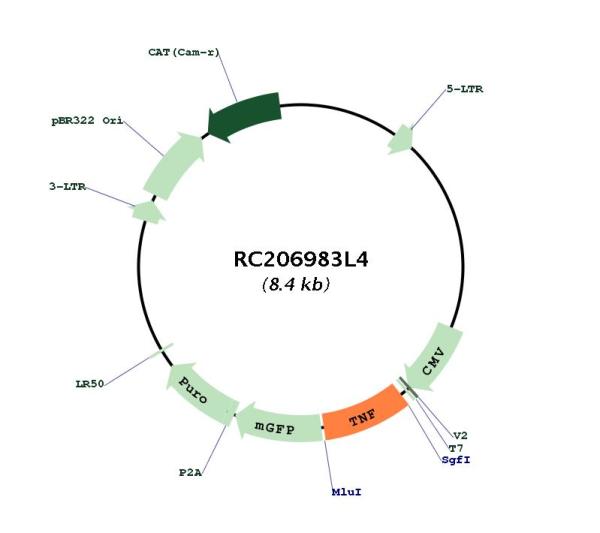TNF alpha (TNF) (NM_000594) Human Tagged Lenti ORF Clone
CAT#: RC206983L4
- LentiORF®
Lenti ORF clone of Human tumor necrosis factor (TNF), mGFP tagged
"NM_000594" in other vectors (6)
USD 365.00
Specifications
| Product Data | |
| Type | Human Tagged ORF Clone |
| Tag | mGFP |
| Symbol | TNF alpha |
| Synonyms | DIF; TNF-alpha; TNFA; TNFSF2; TNLG1F |
| Vector | pLenti-C-mGFP-P2A-Puro |
| E. coli Selection | Chloramphenicol (34 ug/mL) |
| Mammalian Cell Selection | Puromycin |
| Sequence Data |
The ORF insert of this clone is exactly the same as(RC206983).
|
| Restriction Sites |
SgfI-MluI
Cloning Scheme for this gene
Plasmid Map

|
| ACCN | NM_000594 |
| ORF Size | 699 bp |
| OTI Disclaimer | Due to the inherent nature of this plasmid, standard methods to replicate additional amounts of DNA in E. coli are highly likely to result in mutations and/or rearrangements. Therefore, OriGene does not guarantee the capability to replicate this plasmid DNA. Additional amounts of DNA can be purchased from OriGene with batch-specific, full-sequence verification at a reduced cost. Please contact our customer care team at custsupport@origene.com or by calling 301.340.3188 option 3 for pricing and delivery. The molecular sequence of this clone aligns with the gene accession number as a point of reference only. However, individual transcript sequences of the same gene can differ through naturally occurring variations (e.g. polymorphisms), each with its own valid existence. This clone is substantially in agreement with the reference, but a complete review of all prevailing variants is recommended prior to use. More info |
| OTI Annotation | This clone was engineered to express the complete ORF with an expression tag. Expression varies depending on the nature of the gene. |
| Product Components | The ORF clone is ion-exchange column purified and shipped in a 2D barcoded Matrix tube containing 10ug of transfection-ready, dried plasmid DNA (reconstitute with 100 ul of water). |
| Reconstitution | 1. Centrifuge at 5,000xg for 5min. 2. Carefully open the tube and add 100ul of sterile water to dissolve the DNA. 3. Close the tube and incubate for 10 minutes at room temperature. 4. Briefly vortex the tube and then do a quick spin (less than 5000xg) to concentrate the liquid at the bottom. 5. Store the suspended plasmid at -20°C. The DNA is stable for at least one year from date of shipping when stored at -20°C. |
| Reference Data | |
| RefSeq | NM_000594.2 |
| RefSeq Size | 1686 bp |
| RefSeq ORF | 702 bp |
| Locus ID | 7124 |
| UniProt ID | P01375 |
| Cytogenetics | 6p21.33 |
| Protein Families | Druggable Genome, Secreted Protein, Transcription Factors, Transmembrane |
| Protein Pathways | Adipocytokine signaling pathway, Allograft rejection, Alzheimer's disease, Amyotrophic lateral sclerosis (ALS), Apoptosis, Asthma, Cytokine-cytokine receptor interaction, Dilated cardiomyopathy, Fc epsilon RI signaling pathway, Graft-versus-host disease, Hematopoietic cell lineage, Hypertrophic cardiomyopathy (HCM), MAPK signaling pathway, Natural killer cell mediated cytotoxicity, NOD-like receptor signaling pathway, RIG-I-like receptor signaling pathway, Systemic lupus erythematosus, T cell receptor signaling pathway, TGF-beta signaling pathway, Toll-like receptor signaling pathway, Type I diabetes mellitus, Type II diabetes mellitus |
| MW | 25.6 kDa |
| Gene Summary | This gene encodes a multifunctional proinflammatory cytokine that belongs to the tumor necrosis factor (TNF) superfamily. This cytokine is mainly secreted by macrophages. It can bind to, and thus functions through its receptors TNFRSF1A/TNFR1 and TNFRSF1B/TNFBR. This cytokine is involved in the regulation of a wide spectrum of biological processes including cell proliferation, differentiation, apoptosis, lipid metabolism, and coagulation. This cytokine has been implicated in a variety of diseases, including autoimmune diseases, insulin resistance, psoriasis, rheumatoid arthritis ankylosing spondylitis, tuberculosis, autosomal dominant polycystic kidney disease, and cancer. Mutations in this gene affect susceptibility to cerebral malaria, septic shock, and Alzheimer disease. Knockout studies in mice also suggested the neuroprotective function of this cytokine. [provided by RefSeq, Aug 2020] |
Documents
| Product Manuals |
| FAQs |
| SDS |
Resources
Other Versions
| SKU | Description | Size | Price |
|---|---|---|---|
| RC206983 | TNF (Myc-DDK-tagged)-Human tumor necrosis factor (TNF) |
USD 450.00 |
|
| RC206983L1 | Lenti ORF clone of Human tumor necrosis factor (TNF), Myc-DDK-tagged |
USD 750.00 |
|
| RC206983L2 | Lenti ORF clone of Human tumor necrosis factor (TNF), mGFP tagged |
USD 750.00 |
|
| RC206983L3 | Lenti ORF clone of Human tumor necrosis factor (TNF), Myc-DDK-tagged |
USD 750.00 |
|
| RG206983 | TNF (tGFP-tagged) - Human tumor necrosis factor (TNF) |
USD 650.00 |
|
| SC125235 | TNF (untagged)-Human tumor necrosis factor (TNF) |
USD 450.00 |
{0} Product Review(s)
Be the first one to submit a review






























































































































































































































































 Germany
Germany
 Japan
Japan
 United Kingdom
United Kingdom
 China
China


